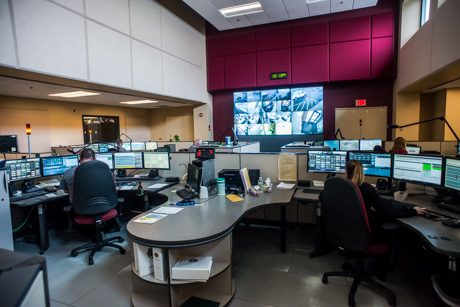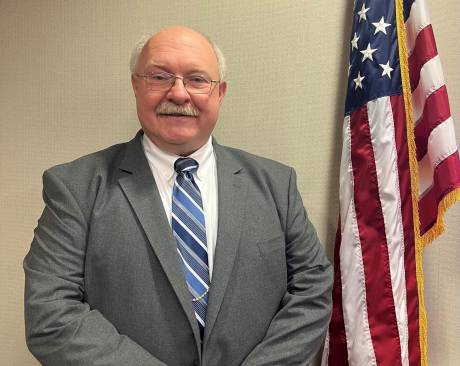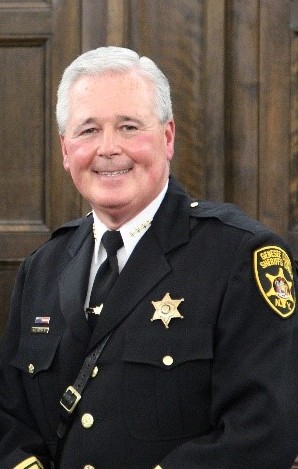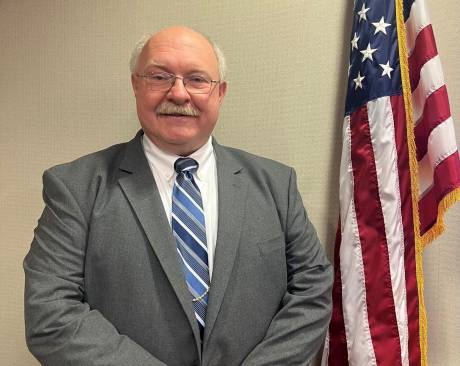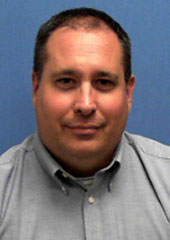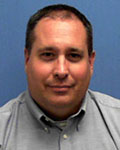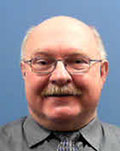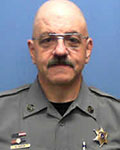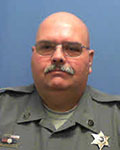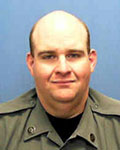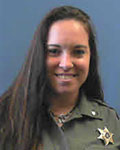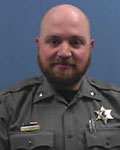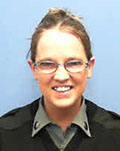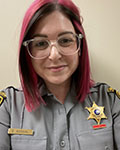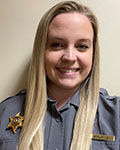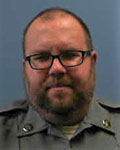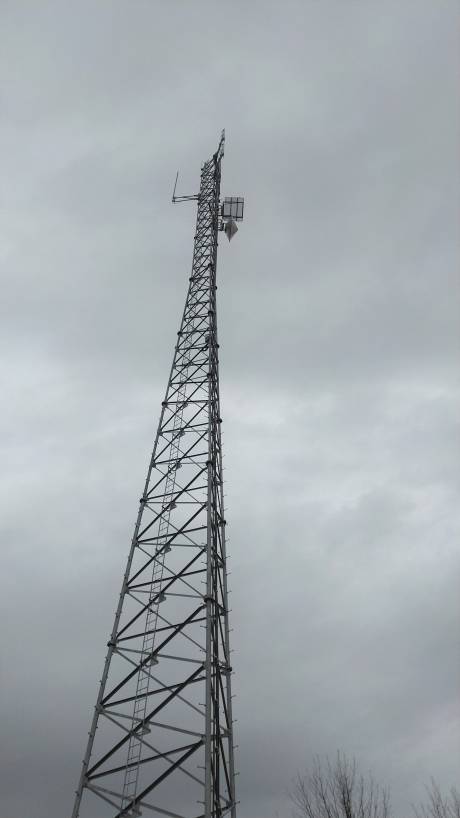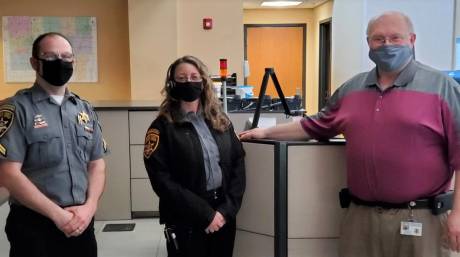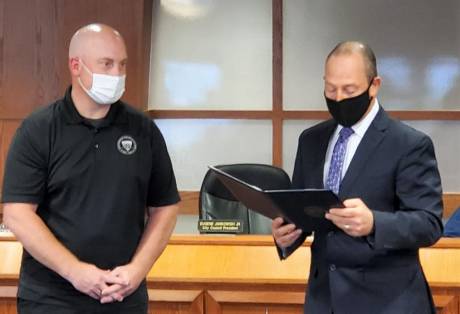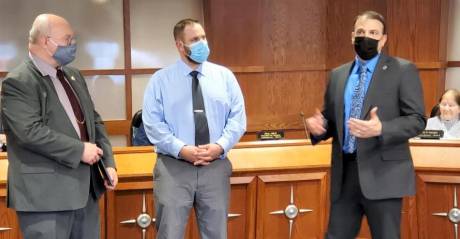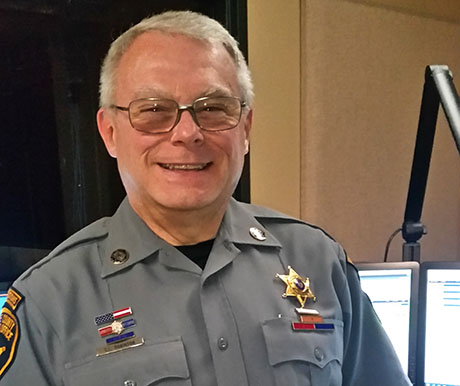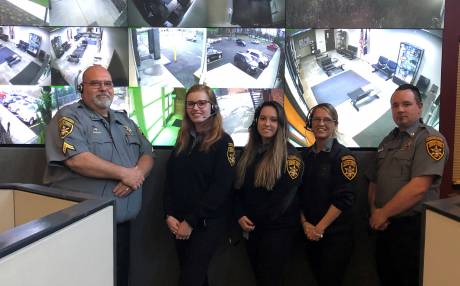When looking at the minimum qualifications and the amount of training that go into shaping a successful emergency dispatcher and pairing that with the competence required in taking a 9-1-1 call, it certainly is puzzling that these professionals are classified by New York State and the federal government as “clerical” workers.
That is the thinking of Director Steven Sharpe, Assistant Director Frank Riccobono and the staff at the Genesee County Emergency Dispatch Center, who are applauding companion bills recently introduced in the state Senate and Assembly to change the classification of dispatchers.
“It’s really all about classifying people according to the labor that they perform,” said Sharpe, in support of the bill that would designate public safety dispatchers, emergency responders, emergency operators, emergency complaint operators, and emergency service dispatchers as “certified first responders.”
Sharpe said that the Genesee County Legislature passed a resolution backing this change when it was considered at the federal level, and “obviously, we would support it at the state level if the state decided to follow suit.”
“What we’re trying to do is to change our classification at the state and federal levels as being first responders – because that is what we are,” Sharpe said. “We’re the first ones on the scene, although remotely, as we have the ability as dispatch staff to dramatically impact the life safety of callers.”
Sharpe said dispatchers have delivered babies, helped people perform cardiopulmonary resuscitation over the phone and helped stabilize a heart attack victim by giving instructions on the administration of aspirin – all over the phone.
“A lot of this stuff happens before first responders have a chance to get there. We work hand-in-hand with our first responders so when they get there, we have hopefully have kept the situation stabilized or made it better while they were traveling to the scene,” he added. “And when they get there, they pick up the pieces where we left off.”
Riccobono: The Job has Changed Dramatically
Riccobono, a dispatcher for more than 30 years, said a key point is recognizing dispatchers for the job they perform.
“I’m sure when the federal government classified dispatchers many years ago, it probably was more clerical,” he said. “The job has changed dramatically since then. Training was five weeks long. Dispatchers now go through typically about a 16-week program and they go through another four to six weeks of on-the-job training. I think most people would agree that that’s more than what a typical clerk would go through.”
Dispatchers may not be at the scene, but they are hearing and providing information to the first responders and from the caller to keep everyone safe, Riccobono offered.
“We’ve had many recent incidents where the dispatcher was instrumental in keeping the person safe. A few years ago, we had an active shooting in the Indian Falls area and the dispatcher was instrumental in instructing the people where to go to keep them safe and an incident just last year where a dispatcher had to tell a person, essentially, to jump out the window when the perpetrator was literally breaking the door down,” he said.
“It’s truly amazing the job that dispatchers do. And this is no disrespect to any clerk position, but you're comparing apples and oranges.”
Riccobono supervises four senior dispatchers – Robert Tripp, John Spencer, Mike Sheflin and Jason Holman – as well as 14 full-time and four part-time dispatchers at the county Emergency Dispatch Center on Park Road.
Dispatchers answer, process and maintain the county’s Enhanced 9-1-1 Emergency Telephone System*, and answer all seven-digit nonemergency and administration lines for all law enforcement agencies within Genesee County. That’s a total of 27 local police, fire and emergency medical agencies, 22 municipalities, other police agencies and the general public.
Dispatchers Share Their Experiences
Tripp and dispatcher Beth Hynes, both with 19 years of experience at the dispatch center, agreed that the job requires the ability to multitask, process information quickly and accurately, and to stay calm under stressful circumstances.
“When people call us, they’re looking for help and looking for someone to respond – whether they’re having a bad day or having fights or need of medical services. A secretary can’t send that,” Hynes said, “whereas we take the information and give them appropriate help as quickly as possible. We are pretty much the first link in the chain of emergency services. It comes to us first and then we proceed to give it out to medical, fire department or police services.”
Hynes said dispatchers are dealing with more domestic violence situations today “because it was always that dirty, little secret that you didn’t hear about that now is coming to the forefront.”
“People with cell phones – they see things – where you have the people involved who are not reporting things but the witnesses are reporting things and we’re responding to that,” she explained. “There’s a lot more violence on the street as well.”
She said she took part in the delivery of a child by a police officer in the City of Batavia.
“A person was in labor, coming from Orleans County driving to the hospital in Batavia and they got to Oak and Richmond and they had to pull over,” she recalled. “I didn’t actually instruct them how to give birth but I heard it as he laid the phone next to the mom. Then the police pulled up and delivered the baby. But I was kind of there. That’s the closest I’ve come (to delivering a baby).”
Tripp said he has taken calls where the person on the other end of the line is suicidal.
“Those hit the nerve the most,” he said. “It kind of gives you that sense of importance, if you will, especially if you are successful in preventing someone from taking their life. Sometimes we’re not so fortunate, but we’re that first line for anybody who needs assistance, whether it’s something medical or fire or somebody that just needs someone to talk to because they don’t where else to go. We take those calls, day in and day out.”
Tripp said dispatchers take an average of 100 to 150 calls per day on his 7 a.m. to 3 p.m. shift alone. Statistics from the sheriff’s office show that in the first quarter of 2021, the dispatch center fielded 18,457 calls.
Classifying dispatchers as first responders would afford a “sense of respect” to the position, Tripp said.
“We work hard and we’re directly involved in emergency services and we have some sort of effect on that incident,” he said. “Plus, this job is ever-evolving as new technology has resulted in new complaints, such as the unemployment fraud that we’re seeing now that wasn’t around 10 years ago.”
Extensive Training is a Requirement
After placing in the top three on the Civil Service list, prospective dispatchers have to pass several physical and psychological tests before entering into 14 to 16 weeks of an initial in-house training program and four to six weeks of additional on-the-job training.
Riccobono said that outside training is provided through the Association of Public Safety Communications Officials and International Academies of Emergency Dispatch. Plus, dispatchers have to be certified in CPR and automated external defibrillator, and are required to take part in up to 50 hours of annual in-service training.
As far as the job classification, Sharpe said he thinks some of the reason this change hasn’t received an overwhelming amount of support is because people may think that dispatchers are seeking an economic boost.
“All it does is say they’re classifying folks as first responders,” he said. “Right now, looking at the state of finances in New York State, I don’t think there would be a large enough push to change the retirement system. That’s not what this legislation is all about.”
Sharpe said seeking a change is not a matter of disparaging the clerical profession.
“What we do is we impact life safety over the phone. And, with that comes the stress,” he said. “Sometimes people forget we’re the first ones on the scene. We’re not physically there but we’re there remotely and we’re experiencing those emotions, and we have to deal with that emotional content.”
*Enhanced 911, E-911 or E911 is a system used in North America to automatically provide caller's location to 9-1-1 dispatchers. 911 is the universal emergency telephone number in the region.
Photo at top: Robert Tripp, Beth Hynes and Frank Riccobono at the Genesee County Emergency Dispatch Center on Park Road. Photo by Mike Pettinella.

